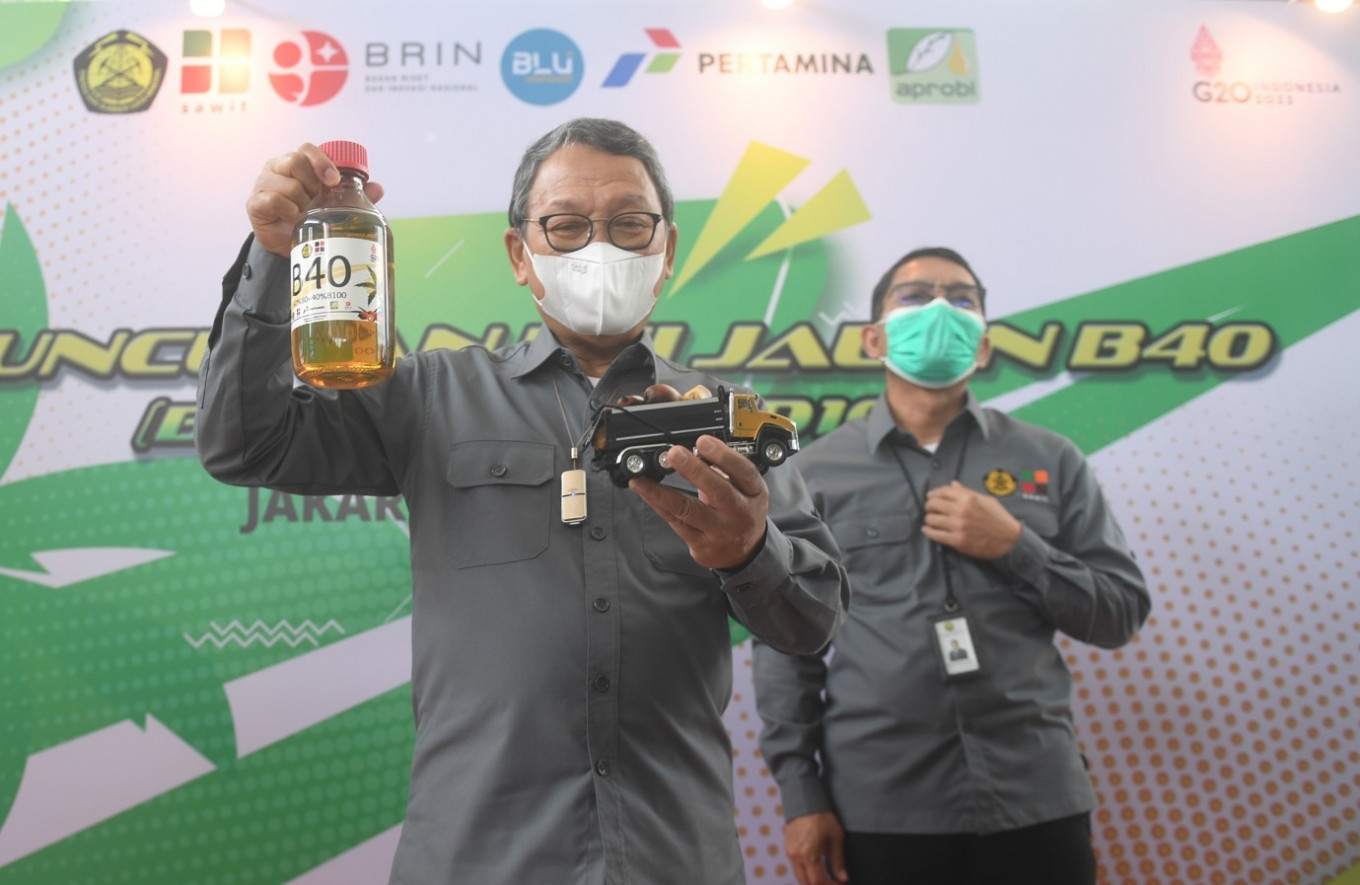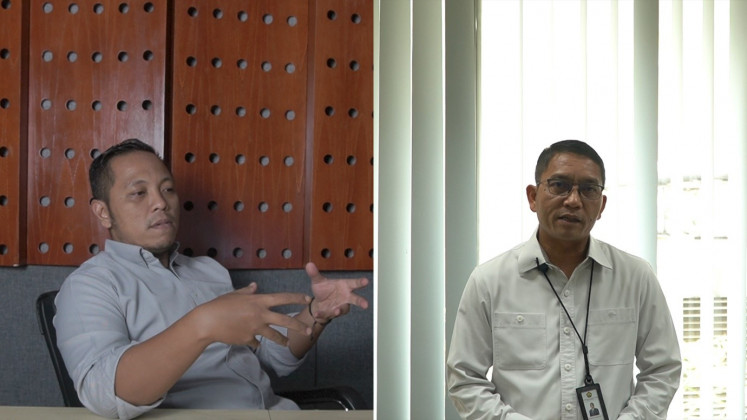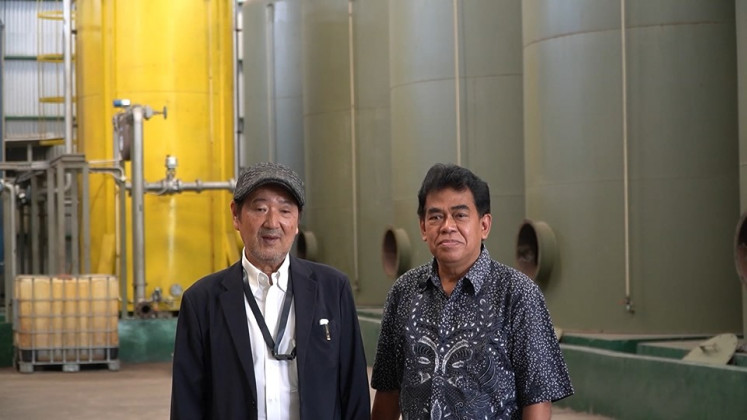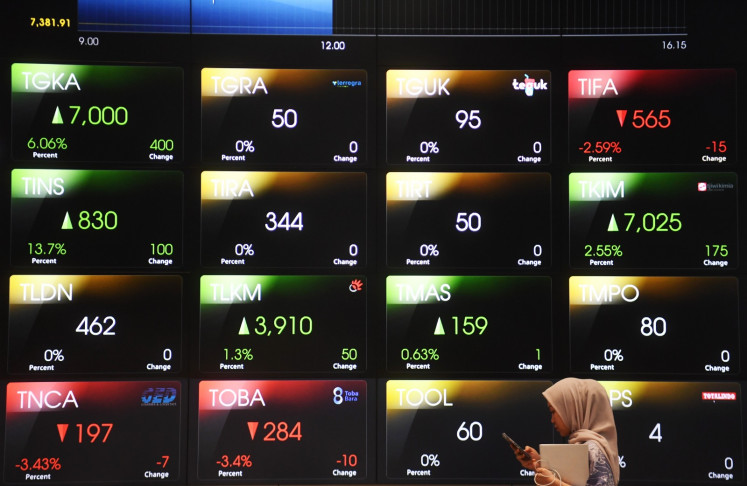Diverse, sustainable biofuels crucial for Indonesia’s energy transition
Change Size
 Energy and Mineral Resources Minister Arifin Tasrif (left), accompanied by the ministry’s director general of new, renewable energy and energy conservation, Dadan Kusdiana, holds up a bottle of B40 fuel after a vehicular road test in Jakarta, on July 27. The road test used two types of fuel, B40 (60 percent diesel and 40 percent biodiesel) and B30D10 (60 percent diesel, 30 percent biodiesel and 10 percent biocarbon) with the purpose of receiving technical recommendations on diesel vehicles before being rolled out for general use. (Antara Foto/Akbar Nugroho Gumay)
Energy and Mineral Resources Minister Arifin Tasrif (left), accompanied by the ministry’s director general of new, renewable energy and energy conservation, Dadan Kusdiana, holds up a bottle of B40 fuel after a vehicular road test in Jakarta, on July 27. The road test used two types of fuel, B40 (60 percent diesel and 40 percent biodiesel) and B30D10 (60 percent diesel, 30 percent biodiesel and 10 percent biocarbon) with the purpose of receiving technical recommendations on diesel vehicles before being rolled out for general use. (Antara Foto/Akbar Nugroho Gumay)
I
ndonesia is at the forefront of biofuel advancement worldwide, especially with regard to biodiesel, both in terms of blending rate and production scale, but its contribution to decarbonization is questionable since the biodiesel is heavily dependent on palm oil as the sole feedstock, risking further environmental damage resulting from unsustainable oil palm plantation practices.
According to Coordinating Economic Affairs Minister Airlangga Hartarto, Indonesia is the largest biodiesel producer in the world, with a production capacity of 137,000 barrels per day (bpd) last year, more than 20 percent higher than the United States in second place with 112,000 bpd and Brazil in third place with 99,000 bpd.
This volume will continue to increase, as the government plans to raise the blending rate of biodiesel for domestic use, while demand for exports of crude palm oil (CPO) is not showing sign of slowing down. The blending rate for domestic use is already at the level of 30 percent since 2019, with plans to increase to 40 percent (B40). But until now, Indonesia remains unclear on its biofuel policy implementation.
When the biofuel policy was initially established in 2006, it aimed to cut Indonesia’s oil imports while at the same time raising renewable energy consumption. Later, when CPO export demand weakened in 2012, leading to a high CPO stock build-up and a deterioration in its price, the biodiesel policy became a strategy to boost CPO sales as well, killing two birds with one stone.
However, when it was time to implement the B40 policy in 2020, the CPO price peaked, rendering the policy uneconomical. Now that the crude oil price is skyrocketing, the government again wishes to achieve B40, with B35 as a preliminary step.
This achievement is expected to help the country reach the 23 percent target of the primary energy mix being sourced from renewable energy by 2025 and its Nationally Determined Contribution (NDC) commitment to become carbon neutral by 2060.
By August 2021, renewable energy sources contributed 12.77 percent to power plants nationwide and the use of biofuel boosted this figure to 13.54 percent in the primary energy mix. With the mandatory B40 in sight, it will further increase the contribution of biofuel to the country’s renewable energy mix.
In theory, biodiesel is an option to achieve the renewable energy target. However, its impact on decarbonization is dubious as Indonesia’s biodiesel production is solely sourced from CPO as its feedstock.
With biodiesel’s high dependency on CPO, coupled with growing demand for CPO to meet cooking oil needs and rising biodiesel target while not followed by commensurate efforts in CPO productivity intensification, Indonesia will have to open a large area of new oil palm plantations, which leads to deforestation.
A study by the Institute for Essential Services Reform (IESR) in 2021 predicts the B30-B50 policy will require another 4 million - 6 million hectares of land to be converted into palm oil plantations to fulfill the domestic and export demand.
Taking into account upstream activities through a lifecycle analysis approach, clearing lands for palm oil plantations to produce biodiesel is more likely to produce greater carbon emissions than what is potentially saved by switching from fossil fuels. Not to mention that deforestation and land clearing are in contrast with Indonesia forestry and other land uses (FOLU) carbon net-sink 2030 target, which is crucial in realizing the country's NDC commitment to be carbon neutral in 2060.
Therefore, in order to reach the renewable energy target in the primary energy mix while staying true to the NDC commitment, the government is advised to diversify its biofuel sources. This idea is actually not new since the government had considered several biofuel feedstocks the first time it decided to develop the country’s renewable energy sector.
When global crude oil price began to rise steeply in the 2000s, surpassing US$70 per barrel in 2005, the Indonesian government started to look at renewable energy sources as alternatives to fossil fuels to reduce the state budget’s burden for fuel imports. The government then formulated the 2006-2025 blueprint on biofuel development for the acceleration of poverty and unemployment reduction that aims for energy independence through biofuel.
The blueprint set a minimum of 5.25 million ha of land dedicated for biofuel feedstocks, with a minimum of 1.5 million ha each allocated for oil palm, jatropha and cassava, and a minimum of 750,000 ha for sugarcane. In the beginning of the program, people were optimistic and eager to participate as farmers and biofuel producers.
However, the market failed, except for oil palm. Jatropha and sugarcane farmers were unable to secure buyers for their harvest due to low and unstable supplies. A jatropha farmer, for example, could only produce 1 – 5 kilograms of the feedstock a month while a biodiesel factory needs a constant supply of 50 tonnes a day.
Bioethanol factories were also unable to secure stable cassava and sugarcane supply. As a result, fifteen biofuel factories shut down by 2013, including PT Medco Ethanol Lampung (MEL), which suffered a $20 million loss in investment.
Only oil palm, which already had an established market for cooking oil production supply, was scalable for commercialization into the biodiesel industry. The industry became stronger especially after the government created in 2015 the Oil Palm Plantation Support Fund Management Agency (BPDPKS), which provides solid financing support for the biofuel industry by collecting levies from exports of CPO and its derivatives.
The mission of the BPDPKS is actually to empower oil palm plantations, including helping smallholders in replanting their plantation and enabling them to implement best farm practices. However, in practice, most of the fund – more than 80 percent – has been used to give subsidies to biodiesel producers to compensate for the price difference between biodiesel and fossil diesel.
For a successful diversification of biodiesel feedstocks, according to Madani Berkelanjutan, government intervention in the forms of fiscal and non-fiscal incentives was needed to establish and bolster the market for other feedstocks. This would allow businesses to try their luck in entering the biofuels business for feedstocks other than palm oil.
One of such businesses is PT Neo Ecology Energy Indonesia (PT NEEI) that is developing an ecosystem to produce jatropha-based biodiesel, comprising jatropha planters or farmers in a number of locations in Indonesia, a biodiesel production facility in Jakarta and captive buyers both in Indonesia and overseas.
The company is in the early stage of partnering with farmers in Anyer, West Java, Banyumas, Central Java and Jembrana, Bali and it will take around three years for them to be able to supply enough jatropha as feedstock for its biodiesel plant in Marunda, Jakarta, that has the capacity of processing 250,000 tons of jatropha per day.
Without the government support, however, NEEI will face an uphill battle to go commercial and make a profit as they have to compete with subsidized diesel and cheaper palm oil-based biodiesel.
Madani Berkelanjutan deputy director Georgio Budi Indarto suggested that the government find ways to help NEEI, the remaining bioethanol plants and future biofuel producers with feedstocks outside palm oil to maintain their commercial productions and make a decent profit.

When companies such as NEEI could continue their operation and make profits, they could develop local production of biodiesel based on local feedstocks. Therefore, Indonesia could achieve energy self-sufficiency by encouraging the decentralization of production and distribution of biofuels.
New, Renewable Energy and Energy Conservation Director General Dadan Kusdiana welcomed all initiatives to diversify feedstocks of biodiesel and even the decentralization of biofuel production and distribution, and said the government would provide support, if necessary.
In the end, however, it all depends on the businesses. If they see profits on the horizon, they will invest. If not, then government intervention is crucial to make the sector attractive for businesses to invest.

Trying business luck with Jatropha
Muhammad Hafnan, founder and CEO of PT New Ecology Energy Indonesia (NEEI), has had a long experience planting jatropha, since 2006, when the government started a program to develop jatropha-based biodiesel. The government program eventually stalled. Now, after getting support from a Japanese friend and investor, he has resumed his venture into jatropha-based biodiesel through PT NEEI.
PT NEEI is currently building a jatropha-based biodiesel plant in Marunda, Jakarta, with a processing capacity of 250,000 tons of jatropha per day. To secure a steady supply of the commodity, PT NEEI is partnering with farmers in a number of localities to plant jatropha trees, with a guarantee from PT NEEI to purchase their harvest at an agreed-upon price. PT NEEI has partnered with jatropha farmers in Anyer, West Java; in Banyumas, Central Java; and in Jembrana, Bali, to plant jatropha trees among their other farming trees.
PT NEEI has also partnered with the country’s largest Islamic organization, Nahdlatul Ulama (NU), particularly the unit that takes care of small and medium fisheries businesses across the country to be the buyers of PT NEEI’s biodiesel. In addition, the company is looking into export opportunities, and currently, according to the company, it has had some buying interest from a number of countries.
He expects that PT NEEI biodiesel plant will start commercial production in three years, when jatropha farmers can supply enough feedstock to the factory.
This article is written in partnership with Tenggara Strategics.










